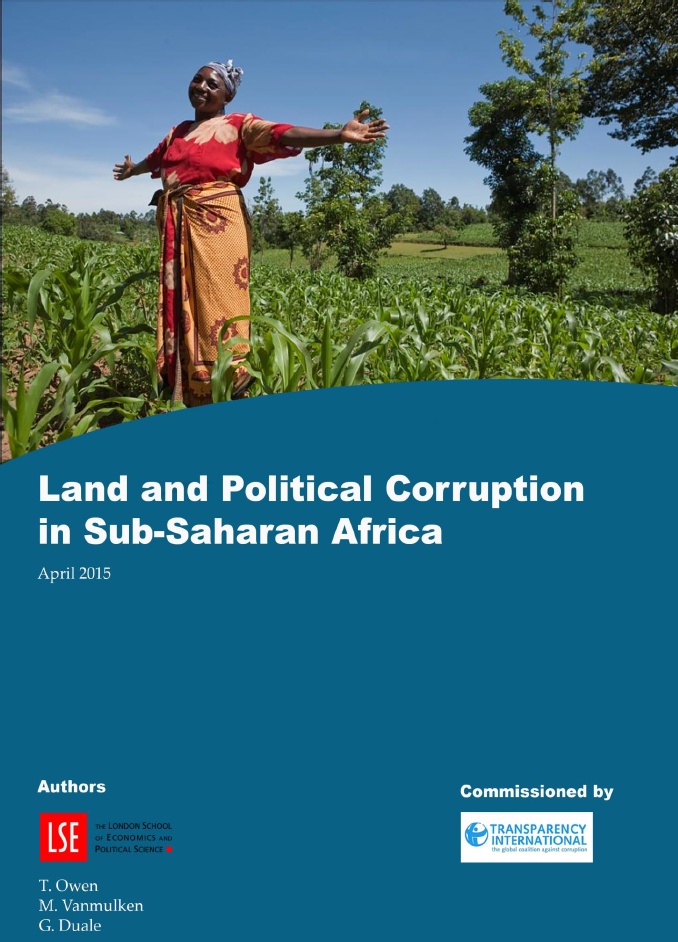 By Milou Vanmulken, Tom Owen and Gogo Duale, MSc Development Management students, 2014-15.
By Milou Vanmulken, Tom Owen and Gogo Duale, MSc Development Management students, 2014-15.
On 17 July 2015, Transparency International published the findings of the consultancy report by three Development Management students on their Anti-Corruption Research Network (ACRN) blog.
The consultancy project is one of the most valuable parts of the MSc Development Management programme. In a team of three, we conducted qualitative research on the role of political corruption in land acquisitions for our client, Transparency International (TI).
The project challenged us to synthesize and translate findings from academic research into useful and practical recommendations. At the same time, we learned to constantly manage our client’s expectations, to frequently update them on our work and to ensure smooth cooperation as a group. In the end, we had a great experience. Our topic was challenging and interesting, we gained a considerable amount of knowledge, and we worked well together as a team.
During our first meeting, Transparency International shared their wish to start exploring corruption in African land sectors, explaining that our research would be part of the theoretical base for their future work. This enhanced our interest in the project as we realised there was freedom to take the research where we wanted.
A better understanding of the role of political corruption is pertinent. In contrast to what discourses about the neopatrimonial state in Africa suggest, corruption is not always the heart of issues and solutions in African land sectors. Hence, it is important to get a holistic view to see if and how the proliferation of land acquisitions, layered land claims and inefficient land administrations are linked to corruption.
From November onwards, we researched and analysed the role of political corruption in Zambian, Kenyan and Ghanaian land sectors. We first created an analytical framework that provides a lens for Transparency International to further investigate political corruption. This is important as the manifestation of political corruption depends on land tenure regimes, which differ sub-nationally as well as between countries. Our findings show how local, national and/or traditional authorities neglect or abuse community and public interest clauses in order to facilitate illegitimate land acquisitions. At the core of this problem is the lack of capacity local communities have to hold authorities accountable.
Following our final presentation in April, Transparency International expressed their enthusiasm about our work, giving compliments about a great and insightful presentation. They asked to publish the report on the Anti-Corruption Research Network (ACRN) website and to present the findings on the ACRN blog. Having worked so hard for more than five months, there’s nothing more satisfying than knowing that our work is meaningful to our client.
The Development Management course has been extremely challenging, yet rewarding. The consultancy project afforded me the opportunity to work with amazing colleagues as well as an internationally recognised organisation like TI, a very unique opportunity. To cap it off, we have received high praise for the quality of our work and a chance to publish it- nothing beats that!”
Gogo Duale
The consultancy project was a great experience that put us at the heart of the link between academia and the development sector. Besides a very interesting topic, amazing team and a great client, I became more aware of the restrictions professional consultants face when doing research – especially when findings contradict what the client wants to hear. In our case, Transparency International gave us a lot of freedom, appreciated our somewhat critical recommendations and rewarded our work by publishing it!
Milou Vanmulken
The consultancy project has been without doubt the highlight of the development management course. Being able to engage with a renowned organisation such as Transparency International was fantastic, and offers great experience for students of international development. The opportunity to publish our report is amazing, and a testament to great teamwork throughout the year!
Tom Owen
About the MSc Development Management
Related Posts
    |
    |






The international land developer is going to launch the new residential project in Sohna, Gurgaon.